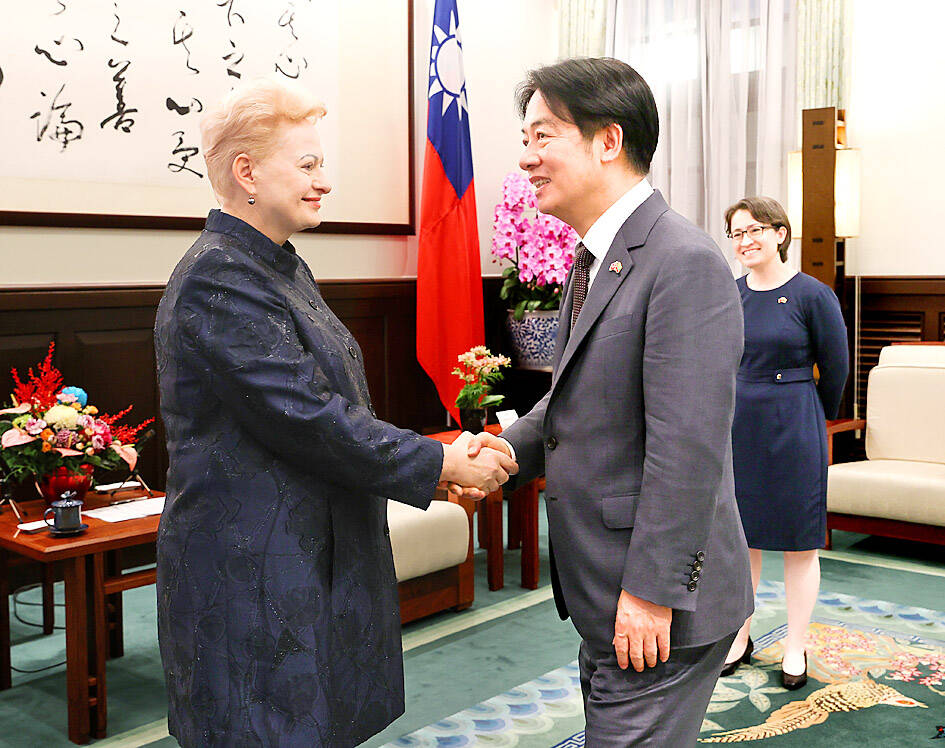President William Lai (賴清德) yesterday continued to receive foreign dignitaries who traveled to Taiwan to participate in Monday’s inauguration ceremony, and congratulated Lai and expressed hopes to continue working with the nation.
In a meeting with former Lithuanian president Dalia Grybauskaite, Lai said global situations and geopolitical strategies are changing rapidly and he hopes that both countries would step up collaborative efforts as they face significant challenges.
Taiwan and Lithuania are small countries trying to survive with strong and unfriendly neighbors, Grybauskaite said, adding that there is much the two nations could learn from each other.

Photo: CNA
In a meeting with Marshall Islands President Hilda Heine, Lai said he is looking forward to working with Heine to create regional peace and prosperity.
Heine said Marshallese are firmly committed to their pledge to be Taiwan’s most stalwart ally and would continue to advocate for the nation on the global stage.
In a meeting with Somaliland House of Elders First Deputy Speaker Said Jama Ali, Lai mentioned “Project Africa” and said he hopes that his administration would continue working with Somaliland.
We hope to broaden the areas we collaborate and thrive together, he said.
Ali congratulated Lai and Vice President Hsiao Bi-khim (蕭美琴) on their inauguration and said that Taiwan-Somaliland relations have continued to grow over the past few years, underscoring the friendship the two countries share.
Separately, the Taipei Economic and Cultural Representative Office (TECRO) in Washington held a celebratory event to mark the inauguration at the Twin Oaks estate, which US House of Representatives Foreign Affairs Committee Chairman Michael McCaul attended.
McCaul congratulated the Democratic Progressive Party on its historic third consecutive win and said Taiwan-US relations have never been closer than this year, which coincidentally was the 45th year of the signing of the Taiwan Relations Act.
McCaul said he had been reviewing the Chinese Communist Party’s military facilities near Taiwan before the event and said that China is trying to change the “status quo.”
McCaul quoted former US general Douglas MacArthur in defining Taiwan as “the unsinkable carrier” and said the general’s description was more prescient than he might have realized.
McCaul also announced that he would visit Taiwan again at the end of this month and address the situation of delayed US arms deliveries.
Representative to the US Alexander Yui (俞大?) said Lai had clearly stated Taiwan’s act of goodwill in terms of tourism and Chinese students, and called on Beijing to realize that it is speaking with a democratically elected president.
Beijing should not mistake cross-strait relations for cross-party relations and confine itself to dealing with one political party, Yui said.
Yui declined to comment on whether he would continue as a representative, saying: “If the president wants me on the job, I will stay on the job.”

ENDEAVOR MANTA: The ship is programmed to automatically return to its designated home port and would self-destruct if seized by another party The Endeavor Manta, Taiwan’s first military-specification uncrewed surface vehicle (USV) tailor-made to operate in the Taiwan Strait in a bid to bolster the nation’s asymmetric combat capabilities made its first appearance at Kaohsiung’s Singda Harbor yesterday. Taking inspiration from Ukraine’s navy, which is using USVs to force Russia’s Black Sea fleet to take shelter within its own ports, CSBC Taiwan (台灣國際造船) established a research and development unit on USVs last year, CSBC chairman Huang Cheng-hung (黃正弘) said. With the exception of the satellite guidance system and the outboard motors — which were purchased from foreign companies that were not affiliated with Chinese-funded

PERMIT REVOKED: The influencer at a news conference said the National Immigration Agency was infringing on human rights and persecuting Chinese spouses Chinese influencer “Yaya in Taiwan” (亞亞在台灣) yesterday evening voluntarily left Taiwan, despite saying yesterday morning that she had “no intention” of leaving after her residence permit was revoked over her comments on Taiwan being “unified” with China by military force. The Ministry of the Interior yesterday had said that it could forcibly deport the influencer at midnight, but was considering taking a more flexible approach and beginning procedures this morning. The influencer, whose given name is Liu Zhenya (劉振亞), departed on a 8:45pm flight from Taipei International Airport (Songshan airport) to Fuzhou, China. Liu held a news conference at the airport at 7pm,

AIR SUPPORT: The Ministry of National Defense thanked the US for the delivery, adding that it was an indicator of the White House’s commitment to the Taiwan Relations Act Deputy Minister of National Defense Po Horng-huei (柏鴻輝) and Representative to the US Alexander Yui on Friday attended a delivery ceremony for the first of Taiwan’s long-awaited 66 F-16C/D Block 70 jets at a Lockheed Martin Corp factory in Greenville, South Carolina. “We are so proud to be the global home of the F-16 and to support Taiwan’s air defense capabilities,” US Representative William Timmons wrote on X, alongside a photograph of Taiwanese and US officials at the event. The F-16C/D Block 70 jets Taiwan ordered have the same capabilities as aircraft that had been upgraded to F-16Vs. The batch of Lockheed Martin

GRIDLOCK: The National Fire Agency’s Special Search and Rescue team is on standby to travel to the countries to help out with the rescue effort A powerful earthquake rocked Myanmar and neighboring Thailand yesterday, killing at least three people in Bangkok and burying dozens when a high-rise building under construction collapsed. Footage shared on social media from Myanmar’s second-largest city showed widespread destruction, raising fears that many were trapped under the rubble or killed. The magnitude 7.7 earthquake, with an epicenter near Mandalay in Myanmar, struck at midday and was followed by a strong magnitude 6.4 aftershock. The extent of death, injury and destruction — especially in Myanmar, which is embroiled in a civil war and where information is tightly controlled at the best of times —